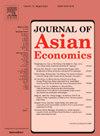央行的韧性是否容易受到气候风险的影响?汇率稳定与绿色政策的作用
IF 3.4
3区 经济学
Q1 ECONOMICS
引用次数: 0
摘要
本研究首次对气候风险如何破坏央行弹性进行了全面的实证调查,这是气候-金融稳定关系中一个关键但尚未得到充分研究的维度。利用来自115个国家(1998-2020年)的面板数据和解决内生性问题的强大计量经济学方法,我们发现气候脆弱性的加剧严重损害了央行的独立性、透明度和偿付能力。我们发现了一种以前未被探索过的传导机制,其中气候冲击迫使央行稳定汇率,赋予它们有限的操作自由裁量权,同时侵蚀了机构透明度。值得注意的是,我们确定了抵御这些不利影响的两个潜在屏障:央行绿色政策和金融开放。我们的异质性分析揭示了惊人的区域和结构模式,美洲的央行在全球范围内面临着最高的脆弱性。在产出波动大、政府债务高、文化不透明、利率低和民主制度薄弱的环境中,负面影响会加剧。这些发现对气候不确定时代的货币政策框架具有深远的影响,并为加强央行抵御不断升级的环境威胁的能力提供了可行的指导。本文章由计算机程序翻译,如有差异,请以英文原文为准。
Is central bank resilience vulnerable to climate risks? The role of exchange rate stability and green policies
This study provides the first comprehensive empirical investigation into how climate risk undermines central bank resilience—a critical yet understudied dimension of the climate-financial stability nexus. Using panel data from 115 countries (1998–2020) and robust econometric approaches addressing endogeneity, we document that heightened climate vulnerability significantly impairs central bank independence, transparency, and solvency. We uncover a previously unexplored transmission mechanism wherein climate shocks pressure central banks toward exchange rate stabilization, granting them limited operational discretion while eroding institutional transparency. Notably, we identify two potential shields against these detrimental effects: central bank green policies and financial openness. Our heterogeneity analysis reveals striking regional and structural patterns, with central banks in the Americas facing the highest vulnerability globally. The negative impact intensifies in environments characterized by high output volatility, elevated government debt, cultural opacity, low interest rates, and weak democratic institutions. These findings have profound implications for monetary policy frameworks in an era of climate uncertainty and offer actionable guidance for strengthening central bank resilience against escalating environmental threats.
求助全文
通过发布文献求助,成功后即可免费获取论文全文。
去求助
来源期刊

Journal of Asian Economics
ECONOMICS-
CiteScore
4.70
自引率
9.40%
发文量
90
期刊介绍:
The Journal of Asian Economics provides a forum for publication of increasingly growing research in Asian economic studies and a unique forum for continental Asian economic studies with focus on (i) special studies in adaptive innovation paradigms in Asian economic regimes, (ii) studies relative to unique dimensions of Asian economic development paradigm, as they are investigated by researchers, (iii) comparative studies of development paradigms in other developing continents, Latin America and Africa, (iv) the emerging new pattern of comparative advantages between Asian countries and the United States and North America.
 求助内容:
求助内容: 应助结果提醒方式:
应助结果提醒方式:


